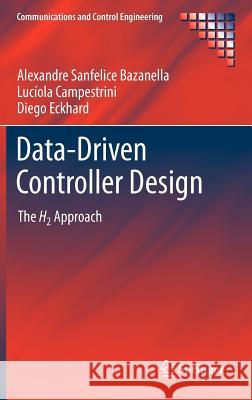Data-Driven Controller Design: The H2 Approach » książka
Data-Driven Controller Design: The H2 Approach
ISBN-13: 9789400722996 / Angielski / Twarda / 2011 / 208 str.
Data-Driven Controller Design: The H2 Approach
ISBN-13: 9789400722996 / Angielski / Twarda / 2011 / 208 str.
(netto: 573,71 VAT: 5%)
Najniższa cena z 30 dni: 578,30
ok. 22 dni roboczych.
Darmowa dostawa!
Data-Based Controller Design presents a comprehensive analysis of data-based control design. It brings together the different data-based design methods that have been presented in the literature since the late 1990 s. To the best knowledge of the author, these data-based design methods have never been collected in a single text, analyzed in depth or compared to each other, and this severely limits their widespread application. In this book these methods will be presented under a common theoretical framework, which fits also a large family of adaptive control methods: the MRAC (Model Reference Adaptive Control) methods. This common theoretical framework has been developed and presented very recently. The book is primarily intended for PhD students and researchers - senior or junior - in control systems. It should serve as teaching material for data-based and adaptive control courses at the graduate level, as well as for reference material for PhD theses. It should also be useful for advanced engineers willing to apply data-based design. As a matter of fact, the concepts in this book are being used, under the author s supervision, for developing new software products in a automation company. The book will present simulation examples along the text. Practical applications of the concepts and methodologies will be presented in a specific chapter."
Data-driven methodologies have recently emerged as an important paradigm alternative to model-based controller design and several such methodologies are formulated as an H2 performance optimization. This book presents a comprehensive theoretical treatment of the H2 approach to data-driven control design. The fundamental properties implied by the H2 problem formulation are analyzed in detail, so that common features to all solutions are identified. Direct methods (VRFT) and iterative methods (IFT, DFT, CbT) are put under a common theoretical framework. The choice of the reference model, the experimental conditions, the optimization method to be used, and several other designer s choices are crucial to the quality of the final outcome, and firm guidelines for all these choices are derived from the theoretical analysis presented. The practical application of the concepts in the book is illustrated with a large number of practical designs performed for different classes of processes: thermal, fluid processing and electromechanical. §Covers data-driven control design, using four different data-driven design methodologies: VRFT, IFT, DFT, CbT; Employs both theoretical formalism and practical insights;Provides experimental results illustrating the application of the methodologies for the main classes of processes found in industry: mechanical, thermal, and fluid processing;Analyzes design choices in depth; processes demonstrated such that readers easily can connect the results obtained with the theory presented; Enables readers to understand the potential and limitations of each data-driven methodology for his/her particular application, chose the best methodology for his/her application, and code it with the appropriate design choices.











